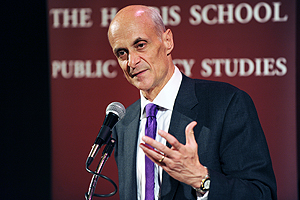Former Homeland Security chief Chertoff points to new national threats from small groups in ungoverned spaces
By Elizabeth Jenkinsjenkinse@uchicago.edu
Harris School of Public Policy Studies
 Michael Chertoff, former U.S. Secretary of Homeland Security, speaks at the Harris Schoolís Deanís International Council gathering. The council advises the Harris School of Public Policy Studies on issues of international importance and is a source of new policy initiatives and resource development. |
|
Michael Chertoff, former U.S. Secretary of Homeland Security, spoke to the Harris School’s Dean’s International Council earlier this month about the various emerging threats to U.S. security in a technology-driven world. He touched on a wide range of topics, from foreign militant groups to Mexican drug cartels to non-military issues such as pandemic flu.
The Cold War structure of two superpowers that could—but most likely would not—annihilate each other has disappeared, said Chertoff. In its place is a world where technology enables any small group to cause large-scale death and devastation.
“It’s no longer a nascent state that has the monopoly on the use of the kind of force that can be catastrophic,” he said. And with this technology, destruction by small bands of terrorists, especially with nuclear weapons, holds graver consequences than ever before.
Among the foreign threats to U.S. national security, Chertoff listed Pakistan, Afghanistan, Yemen and Somalia. These countries all have “ungoverned spaces” in which extremists—from al Qaeda to pirates—can operate.
“All of these ungoverned spaces will be a significant problem for us. There is no option to leave that alone,” he said of one lesson the United States learned from the Sept. 11 attacks. Additionally, he argued, concessions to extremists do not work, but only “increase the appetite.”
Shifting to Iran, Chertoff labeled the country’s movement toward developing a nuclear bomb a “serious consequence for the world.” He said Iranian possession of a nuclear bomb would “fundamentally alter the balance of power in the Middle East” and possibly spur other nations in the region to follow.
Chertoff also pointed to threats closer to home, including Mexico’s flourishing drug cartels along the U.S. border. “The biggest degradation to our security in the quickest period of time would occur if President Calderón lost his battle in Mexico.”
The United States must give Mexico much needed assistance, or America’s southern border will resemble the Pakistan-Afghanistan border, where bold terrorist organizations feel secure. He again noted how technology influences terrorism by linking the use of the Internet to the beheading of some cartel victims.
Chertoff also discussed threats to cyber systems and the dangers of contagious diseases. He called the reaction to the recent pandemic flu threat an example of what is both right and wrong with the U.S. government’s risk management—only addressing it when it is happening. He attributed the well-executed swine flu response plan to the Bush administration’s preparation for avian flu and warned against officials letting down their guard as the flu appears less dangerous than originally anticipated.
“All the threats I’ve talked about can be managed,” he said. “But they can only be managed if we take them seriously.” And the U.S. government must look ahead beyond immediate crises.
Chertoff, who recently set up a risk-management consulting firm, spoke at the biannual meeting of the Harris School’s Dean’s International Council, a prestigious group of leaders from the United States and around the world. Council members act as an advisory group to the Harris School in issues of international importance and are a source of new policy initiatives and resource development.
![[Chronicle]](/images/sidebar_header_oct06.gif)